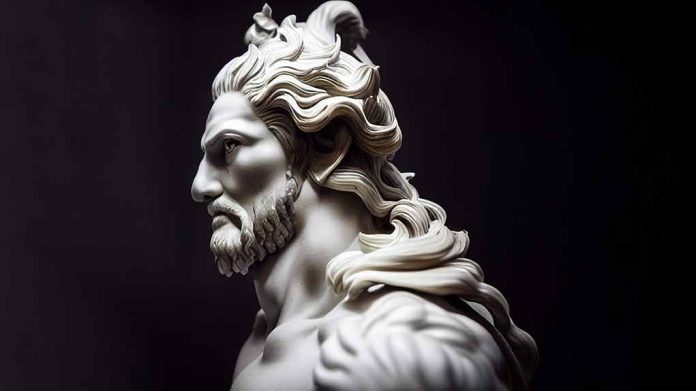
Yes, yes. We know.
Pluto was downgraded to a dwarf planet a few years back.
We got the memo.
That doesn’t mean that astrologers are going to change the way we use Pluto. Nothing about Pluto’s vibe or reflection in a chart has changed and he’s incredibly important. Pluto is still the planet of transformation, death, regeneration, the inevitable, and procreation.
Cool Facts About Pluto
Pluto was discovered in 1930 by astronomer Clyde Tombaugh, and at the time was named as the ninth planet in our solar system. Pluto is very small in comparison to his neighbors like Neptune and Uranus, and is even much smaller than Earth. In 2006, scientists redefined what a planet is, and as a result of being so tiny, poor Pluto got kicked out of the planet club.
So, what exactly is Pluto now? Well, he’s what we call a dwarf planet. Pretty tiny compared to the others, Pluto has a diameter that’s only about two-thirds the size of our Moon.
Pluto hangs out in the Kuiper Belt, a region beyond Neptune where a bunch of small, icy bodies distantly revolve around our sun. Now, despite its diminutive size, Pluto has five moons, the largest of which is called Charon. Charon is about half the size of Pluto, so they appear as if they spin around one another like twins. Pluto’s other moons, Styx, Nix, Kerberos, and Hydra, all orbit around both Pluto and Charon.
The Mythology and Archetype of Pluto
Pluto, the Roman god of the underworld, ruled over the realm of the dead and held a prominent place in Roman religion and culture. Known also as the Greek god Hades, Pluto was the son of Saturn (or Kronus in Greek mythology). As one of the three brothers who divided the cosmos upon Saturn’s defeat, Pluto inherited the underworld, while his siblings Jupiter (Zeus) and Neptune (Poseidon) ruled over the heavens and the seas, respectively. .
Pluto was married to Proserpina (or Persephone in Greek mythology), the daughter of Ceres, the goddess of agriculture. The story goes that while Proserpina was gathering flowers, Pluto abducted her and took her to the underworld to become his queen. Ceres, devastated by the loss of her daughter, caused the earth to become barren until Jupiter intervened and negotiated a compromise. As a result, Proserpina was allowed to spend half the year with Pluto and the other half with her mother, symbolizing the changing of the seasons.
As the ruler of the underworld, Pluto had the power to judge the souls of the deceased. The souls of the righteous were guided to the Elysian Fields, the realm of eternal happiness, while the wicked were condemned to Tartarus, a place of torment. Pluto’s realm was also populated by various mythical creatures and figures, including the three-headed dog Cerberus, who guarded the gates of the underworld. Good boy, Cerberus!
Despite his association with death and the afterlife, Pluto was not portrayed as an evil or malevolent deity. He was simply carrying out his duties as the ruler of the realm of the dead. In fact, the Romans held rituals and ceremonies to honor Pluto, seeking his protection and blessings. These rites were often performed to ensure the well-being of deceased ancestors and to seek guidance in matters related to the afterlife.
What Does Pluto Mean in Astrology?
Pluto’s energy is intense and transformative. It represents the process of death and rebirth, symbolizing the cycle of destruction and renewal. When Pluto enters the picture, it’s time for profound change and letting go of what no longer serves us. It encourages us to face our fears, dive into the depths of our soul, and emerge stronger and wiser on the other side.
Pluto is so far away that it takes him 248 Earth years to orbit the Sun. Because of his distance and rather elliptical orbit, the time spent in a single astrological sign can vary from 11.5 to 30.5 years. Retrograde periods can also be quite lengthy depending on where Pluto sits in comparison to the Earth at any given time. Pluto is considered a transpersonal and generational planet as a result. Likely, everyone from your general age group will have Pluto in the same sign. Pluto only truly becomes personal in astrology by aspect and house in your natal chart, otherwise Pluto is seen as a larger societal reflection than a personal planet.
In our personal lives by aspects or transits, Pluto’s vibe triggers deep transformations and forces us to confront our deepest fears and attachments. It guides us to release old patterns and beliefs that hold us back from personal growth. Pluto encourages us to embrace our personal power and reclaim our authenticity.
On a collective level, Pluto’s impact can be seen in societal and cultural shifts. It often coincides with periods of profound social change and upheaval. Just like the mythological Pluto, who ruled the underworld, this vibe unearths hidden truths and exposes societal structures that need to be transformed. Whatever you can build up, Pluto’s vibe can tear down and press on you to start over. Sometimes we need a reboot, and Pluto answers the call.
Pluto rules over themes such as power, control, and the subconscious mind. It delves into the darkest corners of our psyche, uncovering hidden desires, secrets, and buried emotions. It’s like shining a spotlight on the shadows within us, bringing them to the surface for examination and healing.
Pluto rules Scorpio and the 8th house. This connection amplifies its intensity and passion. Those born with strong Pluto placements in their birth chart are often deep, perceptive, and possess strong intuition. They have the ability to transform their lives and the lives of others, harnessing the power of their personal evolution.
It’s important to note that Pluto’s energy is not always easy to navigate. Its transformative power can be intense and sometimes overwhelming. It may stir up deep emotions, bring buried issues to the surface, and create a sense of chaos before the transformational process takes place. However, with awareness and a willingness to engage in personal growth, Pluto’s vibe can lead to profound healing and empowerment.
Copyright 2024 Astrovibe.com


















